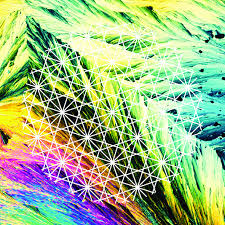Initially one might question the necessity of another band with a silly name, fluorescent album art and descriptions like "afrofunk-space-psych". Indeed, with the recent popularity of bands like Hookworms, Lumerians, and Goat along with the purported conception Psych Fests in Llandudno and Market Harborough, serious music fans have began to express the need to categorise and define "real psychedelic music". Of course they needn’t really bother; some people may find the boorish garage of The Electric Prunes just as mindblowing as Oren Ambarchi.
In this sense, Ostro definitely works to a degree. Formed of long groove-based songs interjected with some short textural pieces, it takes on an aesthetic comparable only to the aquatic funk of Can circa Flow Motion and the gnarled, effects-strewn compositions of Sun Araw. There aren’t many memorable hooks, but the Italian duo’s approach of taking an innocuous bass or keyboard riff and layering on baubles of synth and effects-laden guitars ensures that at the very least the production is interesting throughout. The album takes its name from the wind that blows from Africa to the Mediterranean and this idea certainly finds its way into the heart of the Lay Llamas’ work here. Beats and bass are critically important to the success of tracks like the slowed-down disco groove on ‘We Are You’, the sleazy funk and harmonized fuzz leads on ‘Something Wrong’ and the general sense of a zamrock or afro-rock influence. Synth tones largely veer between deepspace DikMik bleeps and immersive, oceanic pads, whilst you can see the duo clearly has a penchant for creepy vocal effects, with all manner of whispering and reverb-soaked throat singing laced throughout the album.
The duo’s ghostly incantations are an indicator of this album’s overall feeling of discomfort. It’s malevolent trip music, suggested by the sinister whispered refrain on ‘We Are You’ and the persistent mantra on ‘Archaic Revival’: "I wanna get back down." This track’s chromatic two-note bass riff could quite easily have come from the work of mid-period Om, although there’s little of that band’s empowering spiritualism here; this definitely feels like the bad end of drugs. See also the dark, spliff-stasis dirge at the end of ‘Desert Of Lost Souls’, its slow groove mired in clunky organ and cheesy keyboard sitar effects that work surprisingly well. This isn’t a doomy record however, and there’s plenty of bright moments here to pull you out of the fug; most notably in the pretty acid-punk miniature ‘The Lay Llamas’, with its Suicide-referencing keys and biker riffing, as well as the closing piece ‘Voices Call’, which ushers in the reassuringly familiar tones of strummed acoustic guitar, countrified tremolo guitar and a major key to bring the album to a satisfying denouement.
The excellent label Rocket Recordings is partially responsible for today’s glut of psych bands, and most of the best stuff around already exists in their back catalogue. If you want exhilarating afro-rock grooves you might as well reach for Goat. If you want orbital electronic excursions then you’ll probably go for Gnod. Though the Lay Llamas don’t do either of these things as well as those bands, Ostro achieves some success in that it independently creates a mood through its smoky atmospheres and textures. Although there’s not much here to blow you away, it does seem that the Lay Llamas have stumbled upon a useful synthesis of those fashionable psych touchstones – repetitious afro, spacey synth kraut and churning fuzz guitar – which earns a rightful place amongst the rest of the crop.


